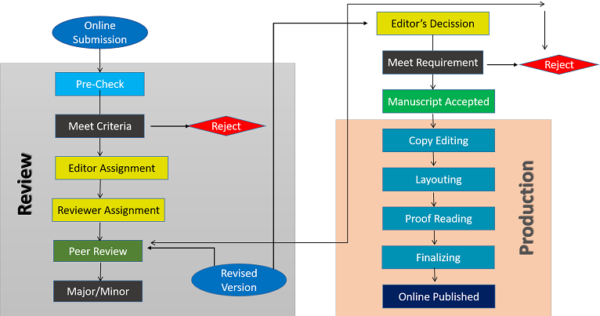
Online Open Access Journal follows the editorial guideline of the Committee on Publication Ethics guidelines and the World Association of Medical Editors Policy Statement on Geopolitical Intrusion on Editorial Decisions. We also strictly follow the recommendations of the International Committee of Medical Journal Editors Recommendations for the Conduct, Reporting, Editing and Publication of Scholarly Work in Medical Journals. Author’s submitting manuscript any of our journals is deemed to be considered as having read, understood and have accepted to abide by the publication policies of the journal.
While submitting the manuscripts, authors must include a declaration stating that the study submitted to be considered for publication has no financial and commercial conflict of interest with others. Editors and the reviewers must also make a statement to this effect that they have executed their functions impartially as reviewers and decision makers without any conflict of personal, financial and commercial interests.
Online Open Access as a publishers support initiatives to improve registration and reporting of data. This includes registering of clinical trials in registries listed on the ICMJE website. If you are unsure whether your trial needs registering, see the ICMJE FAQs. The trial registration number (TRN) and date of registration should be included as the last line of the abstract. Hilaris also encourages authors to register their systematic reviews in a suitable registry (such as PROSPERO). Authors who have registered their systematic review should include the registration number in the manuscript abstract. Authors and reviewers are requested to refer to the following checklists: randomized controlled trials (CONSORT), systematic reviews (PRISMA), observational studies (STROBE), meta-analyses of observational studies (MOOSE), diagnostic accuracy studies (STARD), qualitative studies (RATS), and economic evaluations (CHEERS). Standardized gene nomenclature should be used. Human gene symbols and names can be found in the HUGO Gene Nomenclature Committee (HGNC) database and any enquiries, or requests for new gene symbols, should be directed via email to [email protected]. Authors using unpublished genomic data are expected to abide by the guidelines of the Fort Lauderdale and Toronto agreements. For datasets containing clinical data, authors have an ethical and legal responsibility to respect participants’ rights to privacy and to protect their identity. Authors should gain informed consent for publication of the dataset from participants at the point of recruitment to the trial and state in their cover letter whether informed consent was obtained for publication of patient data. If informed consent was not obtained, authors must state the reason for this, and which body was consulted in the preparation of the dataset. Submission of a manuscript to our journals implies that readily reproducible materials described in the manuscript, including all relevant raw data, will be freely available to any scientist wishing to use them for non-commercial purposes, without breaching participant confidentiality. Nucleotide sequences, protein sequences, and atomic coordinates should be deposited in an appropriate database in time for the accession number to be included in the published article. In computational studies where the sequence information is unacceptable for inclusion in databases because of lack of experimental validation, the sequences must be published as an additional file with the article. Any software described in the manuscript should be available for testing by reviewers in a way that preserves their anonymity. The manuscript should include a description in the ‘availability and requirements’ section of how the reviewers can access the software. The software should be available through a website or be included with the manuscript as an additional file. If published, the software application/tool should be readily available to any scientist wishing to use it for non-commercial purposes, without restrictions, such as the need for a material transfer agreement.
Any manuscript submitted to OOA journals must be original and must not be under consideration/review by any other journal. We strictly checks for plagiarized content and take strict/corrective actions against cases of publication misconduct. OOA endorses ICMJE policies in relation to overlapping publications. Even, replication of text from the authors’ own previous publications is also not acceptable.
OOA Publications ensure that its journals do not publish material that infringes copyright or includes defamatory content. Manuscripts containing material that infringes copyrights and possesses potentially defamatory will be rejected.
Online Open Access Journals takes seriously all allegations of potential misconduct in its publication system. In cases of suspected research or publication misconduct, it may be necessary for the Editors to contact and share manuscripts with third parties. All research involving humans and animals must have been carried out within the appropriate ethical framework and policies with proper approvals. All digital images in the manuscripts considered for publication will be scrutinized for any indication of manipulation, and manipulation may result in retraction of a published article. Cases of suspected misconduct will be reported to the authors’ institutions immediately.
Corrections to, or retractions of published articles will be made by publishing an Erratum or a Retraction article, without altering the original article in any way other than to add a prominent link to the Erratum/Retraction article. In the exceptional event that material is considered to infringe certain rights or is defamatory we may have to remove that material from our site and archive sites without any delay.